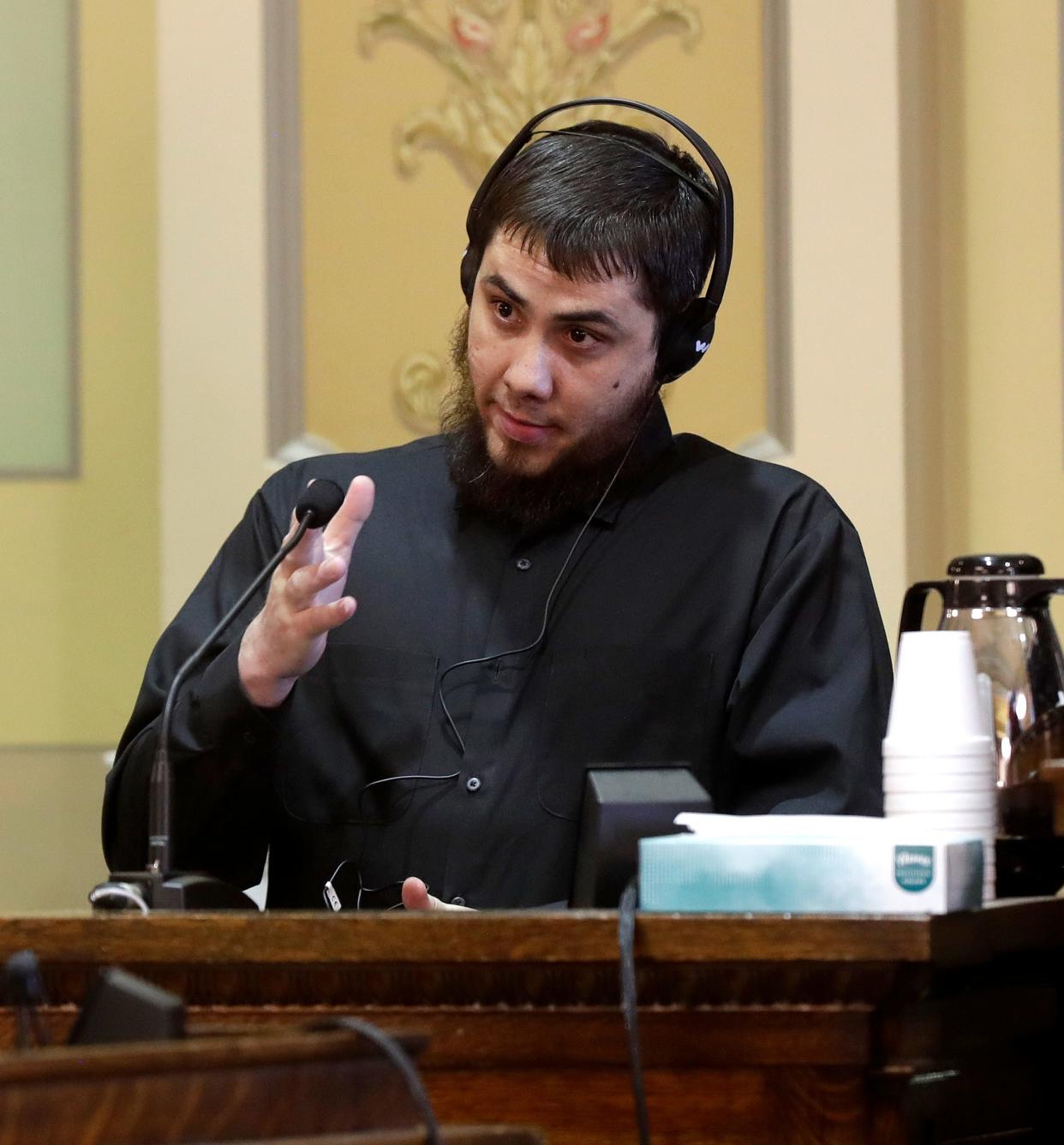Green Bay man sentenced to 4 years in prison for burning body in homicide case

GREEN BAY – A Green Bay man convicted of burning a body that was found in a natural area on the edge of the UW-Green Bay campus in 2021 was sentenced Friday to four years in prison followed by three years of extended supervision.
Jeisaac Rodriguez-Garcia, 30, pleaded guilty to mutilating a corpse, as party to a crime, on April 17.
Rodriguez-Garcia worked as a painter for Pedro Santiago-Marquez, who was convicted of fatally shooting, or ordering the shooting, of Jason Mendez-Ramos, 36, of Ashwaubenon, on Sept. 27, 2021. Rodriguez-Garcia testified at Santiago-Marquez's trial in February that he set fire to "garbage" his boss asked him to dispose of — something heavy, five to six feet long and covered in garbage bags and tarp — that he claimed he only later learned was Mendez-Ramos' body.
Santiago-Marquez, 34, of Green Bay, was sentenced May 30 to life in prison with eligibility for parole in 2064.
At his sentencing, Rodriguez-Garcia apologized for his role in the homicide cover-up. He also said he was under the influence of drugs at the time he burned the body, which made it harder for him to make proper decisions.
"I want to apologize to the family for the whole situation and for my role in the case. With my whole heart I apologize and I ask for a chance to make my life anew," Rodriguez-Garcia said at his sentencing hearing Friday through a Spanish-to-English translator.
Rodriguez-Garcia's stepfather, who raised his stepson since birth, spoke at the sentencing and asked Brown County Circuit Court Judge Beau Liegeois to grant Rodriguez-Garcia the shortest possible sentence. For the prosecution, Mendez-Ramos' father appeared in court via Zoom and gave a victim impact statement requesting the maximum sentence, which was 7½ years in prison with five years of extended supervision.
Rodriguez-Garcia's attorney, Chad Fahrenkrug, requested a sentence of 18 months initial confinement and two years of extended supervision. Fahrenkrug said Rodriguez-Garcia, high on drugs that altered his ability to think clearly, was roped into burning Mendez-Ramos' body without being informed of what had happened.
The real criminals, Fahrenkrug said, were both Santiago-Marquez and Mendez-Ramos, who got into an altercation related to an $80,000 cocaine debt.
At Santiago-Marquez's trial, prosecutors argued that Santiago-Marquez killed Mendez-Ramos after the victim confronted him about money he was owed. Prior to the trial, they had said the debt was related to drug trafficking, but pretrial rulings limited discussion of that during the trial.
"The victim was playing with fire. So was Pedro Marquez. And unfortunately, Jeisaac was also burned," Fahrenkrug said at the sentencing.
Fahrenkrug's request of an 18-month prison sentence was nearly the length Rodriguez-Garcia has already served in Brown County Jail since his arrest in January 2022. When he asked the judge for this sentence, Fahrenkrug pointed to the sentence of the other man convicted of helping cover up the homicide — Alexander Burgos-Mojica, 48, was convicted of harboring or aiding a felon in March and sentenced to one year in prison with five years of extended supervision.
Burgos-Mojica was at the crime scene and helped clean it up, Fahrenkrug said, while Rodriguez-Garcia was not informed that anyone had been killed at the time he set fire to the body, concealed in garbage bags and a tarp.
In sentencing Rodriguez-Garcia, Judge Liegeois acknowledged that Rodriguez-Garcia admitted to investigators that he was addicted to various drugs, including heroin, THC, opiates and prescription drugs. Liegeois also said it was notable that Rodriguez-Garcia had no prior criminal record, he seemed to show remorse, and he testified at Santiago-Marquez's trial without being granted immunity.
However, Liegeois said, the gravity of the crime of burning Mendez-Ramos' body was the primary factor to weigh in deciding Rodriguez-Garcia's sentence.
"It is a significant offense. I mean this is part of a murder, mutilating or destroying the body raises the level of depravity in the murder itself," Liegeois said. "It makes investigating harder, more difficult for law enforcement ... and the second part ... it amplifies the pain and the trauma for the family that is left behind of the deceased victim."
Liegeois went with the prosecution's sentencing recommendation.
RELATED: Man convicted of burning body found near UW-Green Bay campus in 2021 to be sentenced Friday
RELATED: Green Bay man sentenced to life in prison for homicide, mutilating a corpse in 2021 case
RELATED: Brown County jury finds Pedro Santiago-Marquez guilty of killing Ashwaubenon man
Contact Kelli Arseneau at (920) 213-3721 or karseneau@gannett.com. Follow her on Twitter at @ArseneauKelli.
This article originally appeared on Green Bay Press-Gazette: Green Bay man sentenced to prison for burning body in homicide case

